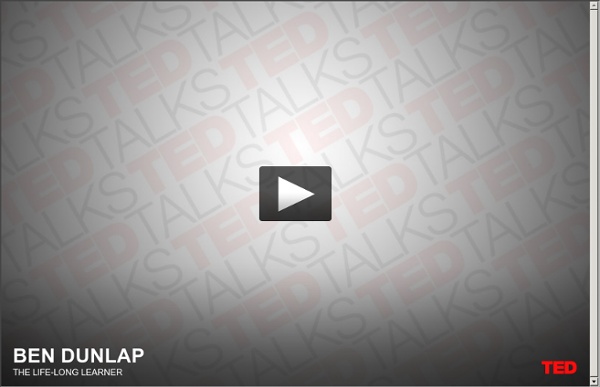



http://www.ted.com/talks/ben_dunlap_talks_about_a_passionate_life.html
Related: Learning to LearnLearn Difficult Concepts with the ADEPT Method After a decade of writing explanations, I’ve simplified the strategy I use to get new concepts to click. Make explanations ADEPT: Use an Analogy, Diagram, Example, Plain-English description, and then a Technical description. Here’s how to teach yourself a difficult idea, or explain one to others. Beating the Forgetting Curve with Distributed Practice “If you read the research on how much people forget after training, it’s depressing. Do a search for the ‘Forgetting Curve’. Once we know something like this, we need to change our approach and educate others.”- Connie Malamed (The eLearning Coach)The above quote is from our interview with Connie Malamed. After our inspiring and thought-provoking interview with Connie Malamed, we were left wondering about the interesting human nature that is revealed with the ‘forgetting curve’, and its impact on learning design.
The 27 Principles to Teaching Yourself Anything (aka The Self-Guided Education Manifesto + PDF download “I have never let my schooling interfere with my education.” —Mark Twain Note: This post is intentionally long. It’s meant to be our compass for learning the skills that matter in the world and throwing theory out the window. Read it. 15 Surprising Discoveries About Learning What are some of the most encouraging known facts about learning? From taking a walk to learning a new language, there are countless things we can do to improve the way we learn. Below we list fifteen steps toward a better brain: 1. Laughter boosts brain function. A Learning Secret: Don’t Take Notes with a Laptop “More is better.” From the number of gigs in a cellular data plan to the horsepower in a pickup truck, this mantra is ubiquitous in American culture. When it comes to college students, the belief that more is better may underlie their widely-held view that laptops in the classroom enhance their academic performance. Laptops do in fact allow students to do more, like engage in online activities and demonstrations, collaborate more easily on papers and projects, access information from the internet, and take more notes. Indeed, because students can type significantly faster than they can write, those who use laptops in the classroom tend to take more notes than those who write out their notes by hand.
35 Psychological Tricks To Help You Learn Better Have you ever considered letting your students listen to hardcore punk while they take their mid-term exam? Decided to do away with Power Point presentations during your lectures? Urged your students to memorize more in order to remember more? From Self-Discovery to Learning Agility in Senior Executives by Suzanne Goebel, Richard Baskerville Suzanne Goebel Georgia State University Richard Baskerville Georgia State UniversitySeptember 20, 2013 Third Annual International Conference on Engaged Management Scholarship, Atlanta, Georgia.
Learning Techniques One of the things that we expect you to pick up by osmosis, but almost never mention explicitly, is techniques for learning itself. After you leave university, you will be expected to be able to learn by yourself for the rest of your life. And an hour spent addressing the meta-issue of learning skills pays off in reduced time to actually learn. A lot of work has been done over the past few decades about how people learn. This document suggests a wide range of techniques that may make your learning more effective.
5 things you should know about how your brain learns From memorizing calculus equations to learning how to cook the perfect bowl of ramen noodles, there is plenty of learning to be done in college. To maximize your educational experience, there is one more item you should learn about — your brain! Though learning preferences differ from person to person, all human brains function in the same general way. Top 10 Strategies for Learning New Skills We tend to think about gaining new skills like we think about winning the lottery: "Gee, it'd sure be nice…" "…Think of all I could do with those new skills and abilities!" "…But the odds of achieving this are so small… mmm, gonna pass."
Anki Flashcards - powerful, intelligent flashcards